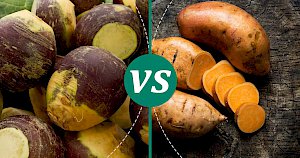Sweet Potato vs Rutabaga: Nutrition & Calories Compare


Sweet potato vs Rutabaga
Nutrition Facts
Serving size:
change
5g10g15g20g30g40g50g60g80g100g120g140g160g180g200g220g250g300g350g400g450g500g600g700g800g900g1000g
1oz2oz3oz4oz5oz6oz7oz8oz10oz12oz15oz20oz25oz30oz35oz40oz50oz
Amount Per Serving:
Serving size:
change
5g10g15g20g30g40g50g60g80g100g120g140g160g180g200g220g250g300g350g400g450g500g600g700g800g900g1000g
1oz2oz3oz4oz5oz6oz7oz8oz10oz12oz15oz20oz25oz30oz35oz40oz50oz
Amount Per Serving:
Sweet Potato vs Rutabaga 100g Compare
| per 100g | Sweet potato | Rutabaga |
|---|---|---|
| Calories | 86 | 37 |
| Carbohydrates | 20.12 g | 8.62 g |
| Fat | 0.05 g | 0.16 g |
| Dietary fiber | 3 g | 2.3 g |
| Protein | 1.57 g | 1.08 g |
| Water | 77.28 g | 89.43 g |
| Calcium | 30 mg | 43 mg |
| Iron | 0.61 mg | 0.44 mg |
| Magnessium | 25 mg | 20 mg |
| Potassium | 337 mg | 305 mg |
| Sodium | 55 mg | 12 mg |
| Vitaminium B1 (Thiamine) | 0.078 mg | 0.09 mg |
| Vitaminium B2 (riboflavin) | 0.061 mg | 0.04 mg |
| Vitaminium B3 (Niacin) | 0.557 mg | 0.7 mg |
| Vitaminium B6 | 0.209 mg | 0.1 mg |
| Vitaminium B9 (Folic acid) | 0.011 mg | 0.021 mg |
| Vitaminium C | 2.4 mg | 25 mg |
| Vitaminium E | 0.26 mg | 0.3 mg |
Discovering the Nutritional Gems: Sweet Potato vs. Rutabaga
When it comes to root vegetables, sweet potatoes and rutabagas are two nutrient-dense options that often spark curiosity and debate among health enthusiasts and food lovers alike. Both have unique histories, flavors, and nutritional profiles that make them stand out in the vegetable world. Let's delve into some interesting facts and nutritional comparisons to help you understand more about these two fascinating foods.
A Closer Look at Sweet Potatoes
Sweet potatoes are not only known for their vibrant orange color but also for their sweet taste and versatility in cooking. Originating in Central and South America, sweet potatoes have been cultivated for thousands of years. They're not just delicious; they're also packed with vitamins, particularly vitamin A in the form of beta-carotene, which is essential for vision, immune function, and skin health.
Unearthing the Rutabaga
Rutabagas, on the other hand, might not boast the same popularity as sweet potatoes, but they hold their own with a rich history and nutritional benefits. Sometimes referred to as swedes or neeps, rutabagas are a cross between turnips and cabbages and were first cultivated in the 17th century. They have a mild, sweet flavor that makes them a versatile addition to various dishes. Notably, they are a great source of vitamin C, essential for immune health and skin integrity.
Nutritional Face-Off
When comparing the nutritional content of sweet potatoes and rutabagas, it's clear that both vegetables are healthful choices, but they serve different nutritional purposes depending on your dietary needs.
- Calories and Macronutrients: Sweet potatoes are higher in calories and carbohydrates, making them a great energy source, especially for active individuals. Rutabagas, with fewer calories and carbs, might be preferred by those managing their calorie intake more strictly.
- Fiber: Both vegetables are good fiber sources, though sweet potatoes have a slight edge. Fiber is crucial for digestive health and can aid in weight management.
- Vitamins and Minerals: Sweet potatoes are an outstanding source of vitamin A and a good source of several B vitamins. Rutabagas, while lower in vitamin A, shine in their vitamin C content, not to mention they have a slightly higher calcium content than sweet potatoes.
While both vegetables are low in fat and protein, they can be part of a balanced diet, providing essential nutrients and benefits. Sweet potatoes, with their higher beta-carotene content, are excellent for those looking to boost their vitamin A intake. Rutabagas, with their higher vitamin C and lower calorie content, can be a great addition to a weight management or immune-boosting diet.
Conclusion
In the end, both sweet potatoes and rutabagas have their place on the dinner table. Whether you're drawn to the sweet, comforting taste of sweet potatoes or the subtle, earthy flavor of rutabagas, incorporating these vegetables into your diet can add a nutritional boost along with variety. Remember, the key to a healthy diet is diversity, so why not enjoy both of these nutritional gems in your meals?
Sweet potato 100g
86kcalCalories source
- 92% CARBS.
- 7% PROTEIN
- 1% FAT
Rutabaga 100g
37kcalCalories source
- 86% CARBS
- 11% PROTEIN
- 4% FAT
Compares of sweet potato
- Sweet Potato vs Artichoke
- Sweet Potato vs Asparagus
- Sweet Potato vs Beetroot
- Sweet Potato vs Pepper
- Sweet Potato vs Bitter Melon
- Sweet Potato vs Broccoli
- see all compares of sweet potato
Marcin Piotrowicz
calories-info.com creator
Healthy diet and healthy lifestyle promoter
Add comment